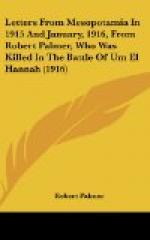There is not much to do. The country is very dull for walking and riding.
The birds here are very few compared to those in India. On the river there are pied Kingfishers. On the flooded land and especially on the mud-flats round it there are large numbers of sandpipers, Kentish and ringed plovers, stints and stilts, terns and gulls, ducks and teal, egrets and cranes: but as there is not a blade of vegetation within a mile of them there are no facilities for observation, still less for shooting.
There are several buzzards and falcons and a few kites, but vultures are conspicuous by their absence. There are no snakes or crocodiles either. Scavenging is left to dogs and jackals; and there is a hooded crow, not very abundant, which is peculiar to this country, having white where the European and Eastern Asiatic species have grey—a handsome bird. In the river there are a few sharks and a great abundance of a carp-like fish which runs up to a very large size. The Quartermaster can buy two 70lb. fish every morning for the men’s breakfasts, and has been offered one of 120lb.
* * * * *
AMARAH,
October 31, 1915.
TO N.B.
I do hope your “fifty submarines” is true. I shan’t think much of you if you can’t get official confirmation from Cousin Arthur: but if he is impenetrably discreet, you might at least get him to explain—or pass it on to me if you know already—what conceivable harm it could do if we published the bare numbers of submarines “accounted for” without any particulars of when, where, or how.
As for this campaign it is the old story of the Empire repeating itself. When it began they only meant to secure the oil-pipe and protect British interests at Basra. But they found to their great surprise that you can’t stay comfortably on the lower waters of a great river with an enemy above you any more than you could live in a flat with the lodger above continually threatening your life. A river like the Tigris or Euphrates is a unit, and the power which occupies its mouth will inevitably be drawn to its source unless it meets the boundaries of a strong and civilised state on the way. Turkey will be neither after the war.
What has happened so far?
[Sidenote: Dec.-Jan.]
We occupied the Shattal-Arab as far as Kurnah.
We sat still. The
Turks, based on Nasiriyah attacked us and nearly recaptured
Basra.
[Sidenote: April]
We beat them at Shaiba, and for safety’s sake had to push them from their base.
[Sidenote: May]
Then the double advance to Amarah and Nasiriyah.
[Sidenote: July]
We pushed the Turks out, and they promptly reformed at Kut and prepared to threaten us again. So we pushed forward again and beat them at Kut.
[Sidenote: September]




